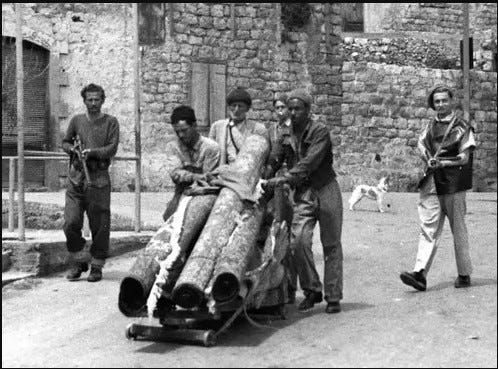Louis Theroux’s The Settlers, produced by the BBC, is one of his most disturbing and urgent documentaries in years. In his signature quiet and inquisitive style, Theroux turns his camera toward the Israeli settler movement in the occupied West Bank — and what he reveals is a deeply unsettling portrait of ideology, power, and dehumanisation.
Theroux doesn’t raise his voice or challenge his subjects with overt confrontation. Instead, he listens — patiently, uncomfortably — and lets the silence speak volumes. It’s a technique he’s refined over decades, and in The Settlers, it’s devastatingly effective. The worst thing you can do to these extremists, it seems, is simply to give them a microphone. They do the rest themselves.
Apartheid
We meet settlers who describe Palestinians as foreigners in their own land — even as they themselves live in illegal outposts under international law. We see Israeli soldiers blocking Palestinian farmers from accessing their fields. And we watch, in real time, how systemic violence is normalised through language, theology, and policy.
What also emerges — quietly, unmistakably — is a portrait of legal and spatial apartheid. While settlers move freely under the protection of Israeli civil law, Palestinians live under military rule, subject to checkpoints, restrictions, and displacement. Theroux never labels it as such; he doesn’t need to. The camera lingers on the lived reality — different laws, different rights, different lives — and trusts the viewer to understand what that means.
Settler queen
Much of the criticism around the film has focused on Daniella Weiss, the settler leader who receives significant screen time. Some argue that she's a fringe figure, unrepresentative of mainstream Israeli society. One would wish that were true. But Weiss, a long-time advocate of expanding settlements and erasing Palestinian sovereignty, has shaped policy and inspired a movement that is anything but marginal. Her platform in the film doesn’t distort reality — it reveals the ideological engine driving much of the settler project.
There is no pretense of balance here, and that’s part of what makes the film powerful. Theroux doesn’t attempt to weigh perspectives as if this were a disagreement between equals. What he shows is an occupation. And he shows it not through narration or analysis, but by quietly documenting how the ideology of settler colonialism expresses itself — in theology, in policy, in routine acts of domination.
The BBC’s decision to commission and air this documentary feels significant. At a time when international coverage of the Israeli-Palestinian conflict is often flattened by both-sides narratives, The Settlers refuses to look away from the asymmetry of power.
This is not a comfortable film to watch. It’s not meant to be. It leaves you angry, shaken, and asking difficult questions — not just about the settlers, but about the systems that enable them, and the global silence that allows it to continue.
The Settlers is essential viewing. And for those who want to understand not just what’s happening in the West Bank, but why, it’s an unflinching place to start.
I might revisit this topic by reviewing Theroux’s earlier film Louis Theroux: The Ultra Zionists — which in many ways laid the groundwork for what we see here. But that will be for another post.
All articles on Diaspora Dialogue are free to read for one year from publication. If you’ve enjoyed this piece and would like to support my work, you can do so by subscribing, or by buying me a coffee. Thank you for reading and being part of the dialogue!








